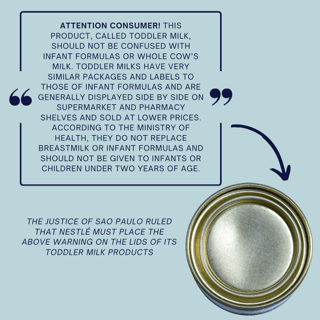April 15, 2025

A new ruling from the Justice of Sao Paulo, Brazil provides an important protection for child health. The decision comes in response to a lawsuit filed by the Brazilian Institute for Consumers Defense (IDEC), a partner supported by the Global Health Advocacy Incubator (GHAI), against Nestlé Brasil for its deceptive marketing practices to promote its ultra-processed toddler milk as an alternative to infant formulas and gives Nestlé 60 days to add a warning label to its products. The lawsuit was presented earlier this year against Nestlé, Danone and Mead Johnson for using deceptive cross-promotion marketing strategies that confuse caregivers and put vulnerable groups at risk. This is a preliminary decision and can be challenged in court by the food and beverage industry.
The Court determined that the current similarities between the two product packages have an unequivocal harmful potential and the power to mislead consumers. The content of the warning label responds to a precautionary measure requested in the lawsuit, based on the grounds of product similarities of labels and packaging (colors, design, etc.) of toddler milks and infant formulas of the three defendants. IDEC’s legal action petition also includes a request for the three corporations to stop their deceptive marketing practices and pay $12 million USD (60 million BRL) due to collective moral damage.
According to Brazilian legal standards and international recommendations, infant formulas are a human milk substitute that must be exceptionally used under specific conditions and with a professional prescription, but their commercial promotion is prohibited. On the other hand, toddler milks are ultra-processed products with a composition that can include 49% sugar, food additives and other ingredients; therefore, they are not recommended for children under 2 years of age. In addition to label and packaging similarities, these products are usually placed side by side on points of commercialization, what makes even harder for consumers to distinguish between them.
“We consider this court ruling highly significant, since it found that the company’s practices violated the Consumer Defense Code by restricting freedom of choice and disregarding the right to adequate information, besides infringing laws on protection of breastfeeding,” said Igor Britto, Director of Institutional Relations for IDEC.
Harmful and unlawful marketing practices of infant formula, toddler milk and baby foods are not new. They represent a global and longstanding challenge that still threatens the health of babies and small children and discourages breastfeeding worldwide. The International Code of Marketing of Breast-milk Substitutes provides critical guidance for States to regulate this public health issue, and there are international recommendations on restricting marketing of products directed to children. Despite this, corporations still manage to confuse and deceive consumers.
GHAI celebrates this important decision and congratulates our partner, Idec. This ruling highlights the key role of the judiciary in protecting the population from corporate practices than can harm the health of present and future generations. GHAI looks forward to the final decision in this case to be a milestone for the Latin American region and broader geographies, holding companies accountable for violating essential human rights.
Related News
View All NewsApril 7, 2025
Advocate Spotlight: Olivia Carter
April 7, 2025



